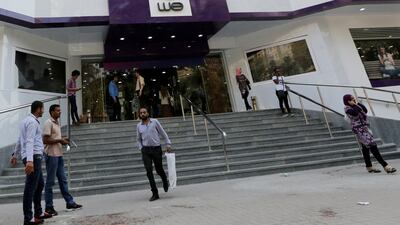Egypt sold a 9.5 per cent stake in the state-run Telecom Egypt valued at 3.7 billion Egyptian pounds ($121 million) on Sunday, as the biggest North African economy continues to pursue its reform agenda.
The deal to sell 162.2 million shares was executed through the Egyptian Stock Exchange, with each share priced at 23.11 Egyptian pounds, the company said in bourse filing.
The government is also offering another 0.5 per cent stake in the firm to Telecom Egypt employees, the company said in a separate filing on Sunday.
The deal was first discussed in March and is the first real step in Cairo's programme that aims to improve the country's worsening economy by selling state assets.
The government announced an overarching economic reform agenda that includes partially selling shareholding either through initial public offerings or through private placements in 32 companies.
The state-linked enterprises include an undisclosed number of companies run by the Egyptian military. Of these, only Wattaneya and Safi have been named.
The Egyptian economy has been hit hard by the pandemic and the war in Ukraine. The currency has lost more than half of its value after three rounds of devaluations since March last year.
The country is trying to secure financial assistance from the International Monetary Fund. To qualify for a loan programme, the Egyptian government has pledged to reduce its role in the economy and limit the expanding presence of military companies.
It has also vowed to increase the role of the private sector in the economy from 30 per cent to 65 per cent by 2025.
An IMF report in January said $8.6 billion in state assets would be sold by the end of this year.
Prime Minister Mostafa Madbouly last month reaffirmed the plan to list state companies, saying 10 more military-run firms would be added to those to be listed through public offerings.
Despite repeated pledges from the government that the programme is still on course, little has been done to float these companies on the stock exchange.
Gulf countries have thus far been Egypt’s main investors as well as the most prolific buyers of state assets. They are expected to be the main beneficiaries of the government’s efforts to sell stakes in those entities.
Last year, 66 mergers and acquisitions were completed in Egypt, more than double the number of the previous year. Companies from the UAE and Saudi Arabia bought stakes in 40 of those deals.
The UAE’s National Paints this month acquired an 81 per cent shareholding of Egypt’s state-owned Paint and Chemicals Industries, purchasing a total of 19.358 million of the company’s shares worth $25 million.


